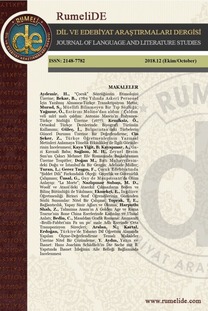“Bir şehri bir mevsime dönüştürmek”: İklim Felaketine Üç Şiirsel Müdahale
Son yirmi yıldır, iklim değişikliği—ya da daha doğrusu “iklim felaketi” olarak tanımlanması gereken problem—çoğu sosyal ve bilimsel çalışmanın öncelik konuları arasında yer almaktadır. Bilimsel veriler çerçevesinde bu durumu dünyadaki yaşamın bir gerçekliği belki de varoluşsal bir son olarak kabul ediyoruz ve yavaş yavaş yaşam biçimimizi büyük ölçüde değiştirmemiz gerektiği gerçeğine alışmış bulunuyoruz. Sanatçıların ve özellikle şairlerin zamanlarının ilerisini görüp buna dair üretimde bulundukları ifade edilir ve bu durum gerçekten de böyledir. Dil Okulu şairlerinden ve bu çalışmada bazı çalışmaları analiz edilen Barrett Watten, Kit Robinson ve Harryette Mullen deneysel ve dinamik yaklaşımlarıyla büyüyen iklim felaketine şiirleriyle müdahalede bulunmuş ve aynı zamanda geleneksel şiirsel dili sorgulamayı da misyon edinmişlerdir. Bu çalışma, burada örneklenen şairlerin şiir dilini, sadece avangard uygulayıcılar olarak değil, aynı zamanda çevre konusunda avangard düşünürler olarak kullandıklarını ortaya koyacak ve çevresel sorunları konu alan ve kamuoyunun dikkatine sunan sanatsal çalışmaları ile, bu sorunları felakete dönüşmeden çok önce ele aldıklarını örneklerle tartışacaktır.
Anahtar Kelimeler:
Dil Şiiri, iklim değişikliği, siyaset, şiir sanatı
“To make a city into a season”: Three Poetic Interventions into Climate Catastrophe
For the last twenty years, climate change—or what may be more properly described as “climate catastrophe”—has been at the forefront of much social and scientific thinking. Given the science, nowadays we accept it as a fact of life on earth, or perhaps an existential force of doom, and are slowly growing used to the fact that we must drastically change the way we live. This paper argues that artistic expression had been addressing such environmental issues years before they had reached the general public’s awareness. Poets always seem to be ahead of their time, and such is the case with three writers associated with the Language School, Barrett Watten, Kit Robinson, and Harryette Mullen, whose work analyzed herein offers interventions—of different ways of approaching—the burgeoning climate catastrophe. Poets associated with the Language School, as the umbrella term suggests, made it their mission to interrogate language (and traditional poetic language) to produce dynamic and experimental writing. They began doing so in the 1970s against the backdrop of 1960s poststructuralist literary theory, especially the work of Jacques Derrida and Michel Foucault. Here it is argued that they were not only avant-garde practitioners of language, but also avant-garde thinkers when it came to the issue of the environment. The poems analyzed here provide readers unique perspectives on an issue that interests so many people today.
Keywords:
Language poetry, climate change, politics, poetics,
___
- Ginsberg, A. (1984). “Howl.” Collected poems 1947-1980. Harper. 126-34.
- Heidegger, M. (1977). Basic writings: from Being and Time (1927) to The Task of Thinking (1964). Ed. and intro. David Farrell Krell. Harper.
- Jameson, F. (1991). Postmodernism, or, the cultural logic of late capitalism. Duke University Press.
- Mullen, H. (2002). Sleeping with the dictionary. University of California Press.
- Robinson, K. (1986). “In the American Tree.” In the American tree: Language, realism, poetry. Ed. Ron Silliman. The National Poetry Foundation. xiii-xiv.
- Watten, B. (1986). “Plasma.” In the American tree: Language, realism, poetry. Ed. Ron Silliman. The National Poetry Foundation. 26-31.
- ISSN: 2148-7782
- Yayın Aralığı: Yılda 6 Sayı
- Başlangıç: 2014
- Yayıncı: Yakup YILMAZ
Sayıdaki Diğer Makaleler
12-Malatya ili ağzında pekiştirme
40-Belagat-ı Osmaniyye’nin açıklamalı günümüz Türkçesi çevirisi üzerine eleştiriler
38-Osmanlı’nın Son Şair Okulu Talebelerinden Biri: Hüseyin Hüsnî Efendi ve Mecmûa-i Edebiyye’si
3-Temel dil becerileri bağlamında Türkçe eğitiminin sahadaki sorunları ve çözüm önerileri
42-İskendername ve Mahzen-i Esrar’a göre Nizâmî’de evrensel eşitlik ideali
Tuncay SAYGIN, Mehmet Mustafa KARACA
21-‘Yeni normal’ ve dilde yenilikler
11-Köktürk, Ötüken-Uygur ve Uygur dönemi eserlerinin sosyal değerler bağlamında incelenmesi
32-Türkan Şoray’ın ikinci dalga kadın hareketi paralelinde değişen kariyeri
10-Kültürün metinler yoluyla aktarımı bağlamında Türkçe ders kitaplarında geleneksel çocuk oyunları
